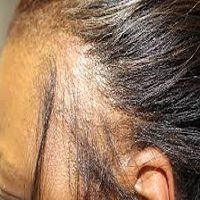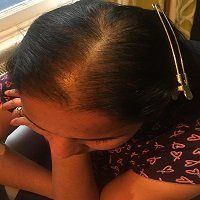Traction Alopecia
Experiencing Traction Alopecia
Tight hairstyles causing hair loss? Traction alopecia is preventable and treatable. Make an appointment so you can start getting the treatment that is right for you.
Book an Appointment
Speak directly with a qualified trichologist and get clear, practical advice.
What is Traction Alopecia?
Traction Alopecia is a hair condition that results in bald patches over the scalp. The hair follicles are weakened and fragile because of the constant tension applied to the individual hairs.
Many young women suffer from Traction Alopecia
What Causes Traction Alopecia?
Traction alopecia is caused by hair styling. When excessive pulling and force on individual hairs, weakens them, until they slide out from the follicle, leaving the area with a balding appearance.
Tight braids, glued in extensions and everyday tight ponytails apply undue force to the hair and result in avoidable, unwanted and unsightly hair loss.
The incorrect use of hair colourant, perming and relaxing solutions exacerbates this form of alopecia.
However, a visit toTrichoSynergy will set your hair on the road to recovery.
We have an excellent track record at restoring the hairline and temples ‘when all hope is lost’. A six treatment program and at home treatment plan, individually tailored to your level of hair loss ensures the best possible outcome.
Buy Traction Alopecia Treatment Here
Who can be affected by traction alopecia?
Traction alopecia can affect anyone who through overly tight or pysical damage to the hair.
It
commonly affects black women who have excessively tight braids installed or hair extensions and weaves and fragile hair.
Black men can also suffer from hair loss due to traction alopecia if they wear cornrows, braids and other African/Caribbean hair styles. With locs often traction alopecia can be accompanied by Male Pattern Hair Loss across the crown.
People who over use dyes, perming or relaxing solutions without giving their hair time to recover can suffer from this form of alopecia.
Can you treat Traction Alopecia?
Yes. This type of alopecia is treatable. Hair can respond well to the various topical medication, especially if treated quickly. Buy Traction Alopecia Treatments Here
Electrotherapy treatment in clinic is highly recommended. This includes high frequency, infra red, LLLT and UV light therapy.
Changing your hairstyle frequently helps in preventing traction alopecia, since the stress on your hair is moved around the scalp and therefore 'wear and tear' is more even. Brushing your hair gently also helps.
It is really important to receive the correct diagnosis for your Alopecia.Your consultation aims to find the root cause and determine the best course of action.
Types of Alopecia
There are many different types of alopecia, all with varying causes. Some of the most common include; Alopecia Areata, Androgenic Alopecia, Centrifugal Cicatrical Alopecia, Chemical Alopecia, Frontal Fibrosing Alopecia, Telogen Effluvium and Traction Alopecia.
Worried about traction alopecia and need more details?
Concerned about thinning from braids or weaves? We'll guide you on the best next step, or have a question before
booking your consultation appointment, complete the form below.
See more hair and scalp conditions
Are you suffering from thinning hair, hair loss, patchy areas or Itchy flaky scalp? If you think you are suffering from any of the conditions you see book an appointment with your local trichologist. The sooner you start treatment the better.
Further reading and case studies related to Traction Alopecia.





